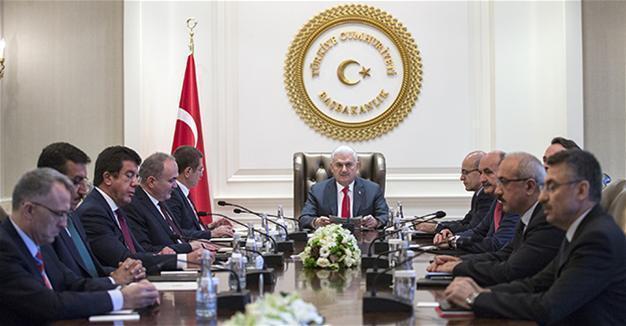Turkish businesses welcome new economic measures
ANKARA/ISTANBUL

AA photo
Turkish business representatives have welcomed a number of key measures announced by the government aimed at boosting the ailing economy and shoring up the Turkish Lira.The government revealed extraordinary measures late on Dec. 8 to revive the Turkish economy, which has been hit by a historic plunge in the lira, vowing to make 2017 a “saving year” for the public sector, and introducing a big fund to accelerate the credit volume and create 600,000 new jobs.
The measures were outlined by Prime Minister Binali Yıldırım that included cheaper funding for companies, easier loan restructuring for banks and a tighter lid on public spending, when announcing the results of the latest economic coordination board (EKK) meeting.
Rifat Hisarcıklıoğlu, the head of the country’s top business organization, the Chambers and Commodity Exchanges of Turkey (TOBB), said the measures were very encouraging and positive in terms of fostering investments, production, employment and exports.
“We have found the measures, which were revealed by Prime Minister Yıldırım and the government in a reforming approach to boost investments, production, employment and exports, very positive and promising,” Hisarcıklıoğlu said in a statement on Dec. 9.
“It is of great significance for us to see the government easing access to financing in areas our businesses have faced difficulties the most, creating mechanisms in a bid to decrease labor costs, and making investment more attractive,” he added.
Hisarcıklıoğlu also said the special emphasis on small- and medium-sized enterprises (SMEs) would especially make a positive contribution to economic growth, adding that with the new measures, the real sector would feel hope rather than uncertainties in the coming year.
The government announced that it would introduce a credit line of up to 250 billion liras ($73 bln) that is especially aimed at SMEs to ease the cash flow problem under the leadership of the Treasury. Ankara Chamber of Industry (ASO) President Nurettin Özdebir said the most satisfying element of the decision was its special emphasis on reforms.
“A planned acceleration in structural reforms is the most satisfying decision for us. Besides, the 100 percent guarantee in export loans will also create a fairly positive impact on our exports. The value added tax (VAT) refunds for construction investments will also enable such investments to accelerate, as their costs will decrease. The plans which will pave the road for the real sector players to restructure their ban loans are also encouraging,” he said, while praising the measures expected to be taken to increase employment. The coordinating president of the Aegean Exporters Assembly, Sabri Ünlütürk, said the 250 billion liras in credit would enable industrial manufacturers to boost their investments.
Confidence in economy
The Anatolian Lions Businessmen’s Association (ASKON) also praised the measures aiming to support the real sector.
“The new package will bring about a relief to markets and raise confidence in the Turkish economy. We have found measures to increase investments to be of special significance, as many investors have recently faced serious difficulties for several reasons. When investors give up, everything stops, unemployment increases, imports go on the rise and the manufacturing sector slows down. The new measures will enable the economy to accelerate again,” said Mustafa Koca, the head of ASKON.
Meanwhile, a research analyst at Destek Investment said the structural reforms and national campaigns to convert foreign currencies into liras will have a positive impact on lira assets.
“Turkey has been in need of incentives to boost employment. It is also good to see that the corporate taxes and investment incentives were reviewed. The EKK meeting results can be seen as a turning point for structural reforms to go back on track again. The acceleration in this process will likely make a positive contribution to Turkey’s credit ratings,” said research analyst Kutay Gözgör.
But Yıldırım’s steps left some economists unconvinced.
“Contrary to market expectations for measures to address currency weakness, the package was mostly about credit growth,” said Nomura economist İnan Demir, as quoted by Reuters, describing the response to the lira weakness as “underwhelming.”
















